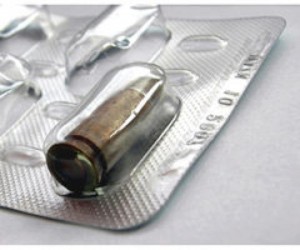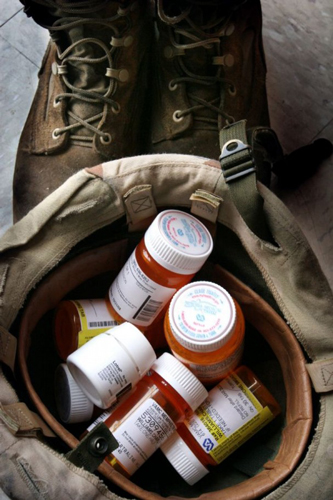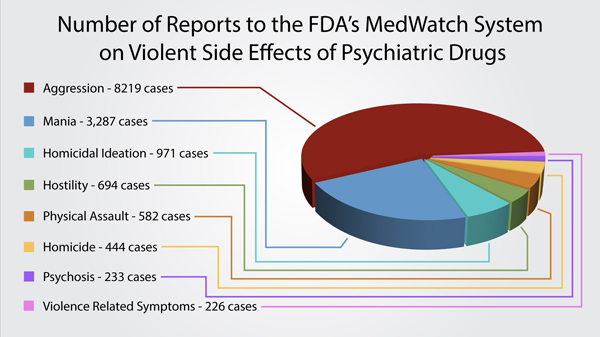By Kelly Patricia O’Meara
April 3, 2014
Violence and psychiatric drugs—a deadly formula America is becoming too intimately familiar with and, the mental health watchdog group, Citizens Commission on Human Rights (CCHR) says that rather than continually send heartfelt condolences to the families of the victims, it is time for lawmakers to investigate the connection between prescription psychiatric drugs and violence.
America learned within hours of the April 2nd shooting at Ft. Hood that four people were dead (including the shooter) and 16 had been wounded in the attack. The shooter, 34-year old Army Specialist, Ivan Lopez, served in Iraq for four months in 2011 and according to The New York Times, Secretary of the Army, John McHugh, said Lopez had been “examined by a psychiatrist within the last month, but showed no signs that he might commit a violent act.” Secretary McHugh further explained to the Senate Armed Services Committee that Lopez “had been prescribed Ambien, a sleep aid, and other medication to treat anxiety and depression.”[1]
CCHR says this sounds sadly familiar to the September 2013 Washington Navy Yard attack by Aaron Alexis, who had been taking the antidepressant, Trazadone, when he killed twelve innocent people. [2]
 CCHR continues that, “psychiatric treatment, in the form of prescription mind-altering drugs, once again is connected to a mass shooting. Yet, despite overwhelming data to support the connection between psychiatric mind-altering drugs and violence, lawmakers have yet to investigate the connection.”
CCHR continues that, “psychiatric treatment, in the form of prescription mind-altering drugs, once again is connected to a mass shooting. Yet, despite overwhelming data to support the connection between psychiatric mind-altering drugs and violence, lawmakers have yet to investigate the connection.”
“The lack of Congressional action isn’t a matter of being unaware of the connection,” states CCHR. For example, in response to the Navy Yard Shooting, U.S. Representative Jeff Miller (R-Fla.), Chairman of the House Committee on Veterans’ Affairs, made the connection between psychiatric drugs and Alexis’s attack almost immediately. During an interview with a Washington, D.C., Radio station, WTOP, Chairman Miller said “one of the medications that Alexis received does have a side effect that could in fact have been a problem.” At that time, Chairman Miller directed the Department of Veterans’ Affairs to save all records relating to the 34-year old Alexis. The reason for this action said Chairman Miller was to “make sure everything that could have been done was done, and that the VA does not do something to change the storyline.” [3]
While the committee’s investigation into the VA’s treatment of Alexis is on-going, a spokesman for the House Committee on Veterans Affairs told CCHR today that the committee “is currently planning a hearing, tentatively scheduled for June of this year, that will focus on veteran suicides and mental health in which the subject of prescription psychiatric drugs will be discussed.”[4]
This is a good start.
But the military long has been aware of the increasing number of military suicides and last August released the findings of the Department of Defense (DOD) 2013 Study title “Risk Factors Associated With Suicide in Current and Former US Military Personnel.” Although the study was based on a questions posed to current and former military personnel, nowhere in the study do the words “drugs” or “medication” appear. The DOD study did conclude in part that, “the most important finding was that mental health problems, including manic-depressive disorder, depression, and alcohol-related problems, were significantly associated with an increase in the risk of suicide.” [5] Yet, the study questionnaire did not ask respondents to provide information about psychiatric drugs they had been prescribed.
 While psychiatric drug information did not make it onto the questionnaire, CCHR explains that there is ample data to support an investigation into the increasing number of psychotropic drugs prescribed to military personnel and the part the drugs may play in the recurring violence.
While psychiatric drug information did not make it onto the questionnaire, CCHR explains that there is ample data to support an investigation into the increasing number of psychotropic drugs prescribed to military personnel and the part the drugs may play in the recurring violence.
- Since 2002, the suicide rate in the U.S. military has almost doubled.[6]
- From 2009 to 2012, more U.S. Soldiers died by suicide than from traffic accidents, heart disease, cancer and homicide.[7]
- In 2012, there were 349 suicides among active duty military personnel – more than were killed in combat in Iraq and Afghanistan.[8]
- Veterans are killing themselves at a rate of 22 a day – one every 65 minutes.[9]
- The U.S. Department of Defense now spends $2 billion a year on mental health alone.[10]
- The Veterans Administration’s mental health budget has soared from less than $3 billion in 2007 to nearly $7 billion in 2014.[11]
- From 2005 to 2011, the Department of Defense and the Veterans Administration increased their prescriptions of psychiatric drugs by nearly seven times. That’s more than thirty times faster than the civilian rate.[12]
- One in six American service members is on at least one psychiatric drug.[13]
- Thirty-seven percent of recent war veterans are being diagnosed with PTSD and 80 percent are of those are prescribed a psychiatric drug.[14]
Add to the above data the fact that there are 22 international drug regulatory warnings on psychiatric drugs, citing effects of mania, hostility, violence and even homicidal ideation. And, the Food and Drug Administration (FDA) MedWatch system on psychiatric drugs reveals that between 2004 and 2012, there have been 14,773 reports on psychiatric drugs causing violent side effects including: 1,531 cases of homicidal ideation/homicide, 3,287 cases of mania & 8,219 cases of aggression.[15]
While offering his condolences, President Obama provided assurances that “we are going to do everything we can to make sure that the community at Fort Hood has what it needs to deal with the current situation, but also any potential aftermath.”[16]
CCHR says that given that the common response to mass shootings is a rush to deliver increased mental health services, which more often than not includes psychiatric drugs, there is no time to waste. Lawmakers must immediately begin an investigation into the possibility that the psychiatric drugs provided as treatment may actually be contributing to the increased violence. There are numerous medical experts that do not have conflicts of interest and could provide lawmakers with valuable information as well as noted national figures who have spoken out on psychiatric drugs and violence.
Watch CCHR’s Hidden Enemy documentary here:
—
Kelly Patricia O’Meara is an award-winning former investigative reporter for the Washington Times’ Insight Magazine, penning dozens of articles exposing the fraud of psychiatric diagnosis and the dangers of the psychiatric drugs—including her ground-breaking 1999 cover story, “Guns & Doses,” exposing the link between psychiatric drugs and acts of senseless violence. She is also the author of the highly acclaimed book, Psyched Out: How Psychiatry Sells Mental Illness and Pushes Pills that Kill. Prior to working as an investigative journalist, O’Meara spent sixteen years on Capitol Hill as a congressional staffer to four Members of Congress. She holds a B.S. in Political Science from the University of Maryland.
—
[1] David Montgomery, Manny Fernandez and Timothy Williams, “Fort Hood Gunman Was Being Treated for Depression,” The New York Times, April 3, 2014, nytimes.com/2014/04/04/us/fort-hood-shooting.html?_r=2
[2] Lena H. Sun, “Trazodone antidepressant, used by Aaron Alexis, described as ‘very safe’” The Washington Post, Sept. 18, 2014, washingtonpost.com/national/health-science/trazodone-antidepressant-used-by-aaron-alexis-described-as-very-safe/2013/09/18/4336c044-20ae-11e3-966c-9c4293c47ebe_story.html
[3] John Aaron, “Congressman: Alexis’ drug may have had ‘problem’ side effect,” WTOP, 103.5 FM, Sept. 201, 2013, wtop.com/1385/3458698/Alexis-prescription-may-have-had-problem-side-effect
[4] Interview with a spokesman for the House Committee on Veterans Affairs conducted by journalist Kelly Patricia O’Meara on behalf of CCHR International, April 3, 2014.
[5] Cynthia A. LeardMann, MPH; Teresa M. Powell, MS; et al., “Risk Factors Associated With Suicide in Current and Former US Military Personnel,” Journal of the American Medical Association, Vol. 310, No. 5, August 7, 2013, jama.jamanetwork.com/article.aspx?articleid=1724276
[6] “Baffling Rise in Suicides Plagues the U.S. Military,” The New York Times, nytimes.com/2013/05/16/us/baffling-rise-in-suicides-plagues-us-military.html?pagewanted=all, May 15, 2013.
[7] Gregg Zoroya, “Suicides No. 2 cause of death in military,” USA TODAY, June 14, 2012, usatoday30.usatoday.com/news/military/story/2012-06-13/military-suicides/55585182/1
[8] Bill Briggs, “Military suicide rate hit record high in 2012,” NBC News, Jan. 14, 2013, usnews.nbcnews.com/_news/2013/01/14/16510852-military-suicide-rate-hit-record-high-in-2012?lite
[9] Moni Basu, “Why suicide rate among veterans may be more than 22 a day,” CNN, Nov. 14, 2013, http://www.cnn.com/2013/09/21/us/22-veteran-suicides-a-day/
[10] Martha Thompson & Nancy Gibbs, “The War On Suicide?” Time Magazine, July 23, 2012, content.time.com/time/magazine/article/0,9171,2119337,00.html
[11] John Ramsey, “The Last Battle: Steven Chadduck lost his home and nearly committed suicide while waiting for help for PTSD,” Fayottesville Observer, Sept. 24, 2012, fayobserver.com/military/article_a0699933-cac5-5ced-8616-f01eef305f16.html; Patricia Kime, “Budget plan gives VA big funding boost for veterans care,” Army Times, Apr. 10, 2013, writerhttp://www.armytimes.com/article/20130410/NEWS/304100023/Budget-plan-gives-VA-big-funding-boost-veterans-care
[12] “War on Drugs,” The New York Times, April 6, 2013, nytimes.com/2013/04/07/opinion/sunday/wars-on-drugs.html
[13] “Medicating the Military,” Army Times, March 17, 2010, armytimes.com/article/20100317/NEWS/3170315/Medicating-military
[14] Susan Donaldson James, “Marines Battalion Mentally Upbeat, Despite Record Deaths,” ABC News, April 15, 2011, abcnews.go.com/Health/camp-pendleton-marine-battalion-mentally-fit-deadliest-war/story?id=13377215; Mohamed S, Rosenheck RA, “Pharmacotherapy of PTSD in the U.S. Department of Veterans Affairs: diagnostic- and symptom-guided drug selection,” Journal of Clinical Psychiatry, 2008, June Vol. 69, No. 6, pp. 959-65, ncbi.nlm.nih.gov/pubmed/18588361
[15] Data available on CCHR International’s website: 22 international warnings: cchrint.org/psychiatric-drugs/drug_warnings_on_violence/; FDA MedWatch Adverse Reaction Reports on psychiatric drugs causing violent side effects: https://www.cchrint.org/2012/07/20/the-aurora-colorado-tragedy-another-senseless-shooting-another-psychotropic-drug/
[16] Lindsay Holst, “The President Delivers a Statement About the Shooting at Fort Hood,” whitehouse.gov/blog/2014/04/02/president-delivers-statement-about-shooting-fort-hood




SHARE YOUR STORY/COMMENT